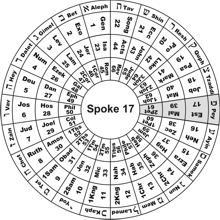Pritzut: Wanton Licentiousness
But chiefly them that walk after the flesh in the lust of uncleanness,
and despise government.
Presumptuous are they, selfwilled, they are not
afraid to speak evil of dignities.
... These are wells without water, clouds that are carried with a
tempest; to whom the mist of darkness is reserved for ever. For when they speak great
swelling words of vanity, they allure through the lusts of the flesh,
through much wantonness ...
2 Peter 2:10ff (Spoke 17, Cycle 3)
This passage is the perfect description of פריצות
(pritzut, wanton licentiousness). In fact, Hebrew dictionaries typically use the
word "wantonness" in their definition of Pritzut! I could continue with the many quotes from
2 Peter that so accurately describe the
pompous pride of these "whose damnation slumbereth not." This all integrates with the
theme of contempt found in both Esther and Malachi, which all
naturally emerges from the Peh KeyWord פנים (panim, face) - the ultimate object of contempt.
The word translated as wantonness in 2 Peter above is
ασελγεια
(Aselgia, S# G0766). Strong's defines it as "unbridled lust, excess, licentiousness, lasciviousness, wantonness,
outrageousness, shamelessness, insolence." The same word is used earlier in 2 Peter, translated as "filthy":
And turning the cities of Sodom and Gomorrha into ashes condemned them
with an overthrow, making them an ensample unto those that after should live ungodly;
And delivered just Lot, vexed with the filthy conversation of the wicked:
(For that righteous man dwelling among them, in seeing and hearing, vexed his righteous
soul from day to day with their unlawful deeds;)
2 Peter 2:6f (Spoke 17, Cycle 3)
All these words perfectly describes the contempt for God exhibited by unbelievers on Spoke 17.
For example, the "riot in the day time" that Peter is talking about can be seen
in all its ugliness in the 180 day (!)
drunken feast that led to Vashti's dethronement in the Book of Esther (cf. Purim).
The Pritzut (wanton licentiousness) of reprobates
infilitrating the churches Agape Feasts made Peter nearly apoplectic as he condemned them
saying they are like "natural brute beasts, made to be taken and destroyed." Immediately
preceding this, he spoke of them as:
But chiefly them that walk after the flesh in the lust of uncleanness, and despise government.
Presumptuous are they, selfwilled, they are not afraid to speak evil of dignities.
11 Whereas angels, which are greater in power and might, bring not railing accusation against them before the Lord.
12 But these, as natural brute beasts, made to be taken and destroyed, speak evil of the things that they understand not;
and shall utterly perish in their own corruption;
2 Peter 2:10-12 (Spoke 17, Cycle 3)
The Greek word translated as "despise" in 2 Peter
2 above (kataphroneo, S# G2706)
is used in the Septuagint (e.g. Proverbs 13.13) to translate the Hebrew "buz"
(contemn/despise), cognate with "bazah" which plays an essential role in
linking Esther with Malachi (see
God's Name Despised), and Esther with Isaiah 17
on the Inner Wheel of Isaiah (cf. God's Lot for His
Enemies).
This echoes in the festival of Purim. As noted by Rabbi Emanuel Feldman
in his article called
Purim, A
Holiday in Hiding, the Purim Festival is
"the Jewish Mardi Gras, a day of revelry, drinking, and masquerades." Both the eating of a
sumptuous meal and drunkenness are mitzvahs -
Rabbinical commandments! (Cf. Purim Mitzvot)
It is a day of riotous partying,
masquarades, and noise making. This all stems from the story
of Esther which began with a 180 day feast and drunken choices that ultimately opened
the way for the salvation of the Jews. The links with the great themes of Spoke 17 are too numerous
to note right now. Besides, it would be a good exercise for the student. I hope the reader will
feel free to write with any insights he or she may have.
|



